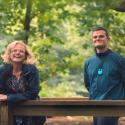Not the least remarkable thing about Richard Linklater's Boyhood is its being shot over a decade – that’s probably a first in film history. And it’s more than a sociological experiment, portraying in vibrant contemporary detail and a lot of observational fun the growing-up in Texas of a little boy, Mason, which will surely have an extraordinary impact on the life of the actor, Ellar Coltrane, who played him. It must be a bit like having a red carpet rolled out for you before you know the meaning of or have ever uttered the words “acting”, “award” and “celebrity”.
Linklater won this year’s Berlinale Best Director award for the movie. It’s a hugely popular win for a familiar figure at the Berlinale, where two of the famous trilogy beginning with 1995’s Before Sunrise, starring Ethan Hawke and Julie Delpy, premiered: the compelling Before Sunset (2004) and (as noted by theartsdesk last year) the underwhelming Before Midnight. If anything Boyhood bears the not entirely welcome traces of the latter with its endless, white, middle-class chit-chat and sometimes noodling, often sentimental dialogue. Fine director, yes; but Linklater should have dared to abdicate from his other role – even if Boyhood was his idea – and hired a much less self-indulgent writer, one with a sense of proportion.
 At two hours and three-quarters Boyhood is much, much too long, though it’s fair to note that its Berlin reception was the opposite of damp, getting wild applause at both press and gala screenings. The first hour traces Mason’s school and family days; his dealings with an emotional mother, played by Patricia Arquette (pictured left), who, now divorced from Mason’s attractive but feckless Dad – Ethan Hawke (of course: he’s dependably good) – falls into marriages with two abusive men; and a chirpy, bratty older sister Samantha – Lorelei Linklater, Richard’s daughter. It’s perfectly watchable, but all a bit stilted and over-familiar too.
At two hours and three-quarters Boyhood is much, much too long, though it’s fair to note that its Berlin reception was the opposite of damp, getting wild applause at both press and gala screenings. The first hour traces Mason’s school and family days; his dealings with an emotional mother, played by Patricia Arquette (pictured left), who, now divorced from Mason’s attractive but feckless Dad – Ethan Hawke (of course: he’s dependably good) – falls into marriages with two abusive men; and a chirpy, bratty older sister Samantha – Lorelei Linklater, Richard’s daughter. It’s perfectly watchable, but all a bit stilted and over-familiar too.
The pace and the humour pick up, perhaps predictably, when Dad engages Mason and Samantha in a talk about sex. Hawke wonderfully catches, and provokes, the shivering embarrassment that a well-meaning parent can induce when quizzing kids about boyfriends and girlfriends. Linklater then provides the most interesting twist in the film: Mason turns into a fey, drifting sort of character, who discovers himself in photography, paints his nails and muses out loud to an intrigued girlfriend about the meaninglessness of everything. He might be gay, but he is most definitely non-redneck, non-Texan, non-sportsman effeminate; and Ellar Coltrane is brilliant at it. (Pictured right, Linklater with stars Ethan Hawke and Ellar Coltrane at this year's Sundance festival).
 Another much-loved Berlinale figure was applauded on Thursday. Ken Loach won this year’s Honorary Golden Bear, and with purse-lipped modesty took to the stage to deliver, finally, quite a passionate message about the need for Europeans to band together not in greed but solidarity for the world’s exploited and marginalised. A rather incompetent annonceuse then introduced a special screening of Loach’s 1993 Raining Stones by asking us all to enjoy “Rolling Stones”. (The band were Berlinale premiere stars in 2008 for Scorsese’s Shine A Light.) I trust the great man didn’t feel miffed and saw the funny side.
Another much-loved Berlinale figure was applauded on Thursday. Ken Loach won this year’s Honorary Golden Bear, and with purse-lipped modesty took to the stage to deliver, finally, quite a passionate message about the need for Europeans to band together not in greed but solidarity for the world’s exploited and marginalised. A rather incompetent annonceuse then introduced a special screening of Loach’s 1993 Raining Stones by asking us all to enjoy “Rolling Stones”. (The band were Berlinale premiere stars in 2008 for Scorsese’s Shine A Light.) I trust the great man didn’t feel miffed and saw the funny side.
Watch Richard Linklater and cast discuss Boyhood at the Sundance festival















Add comment